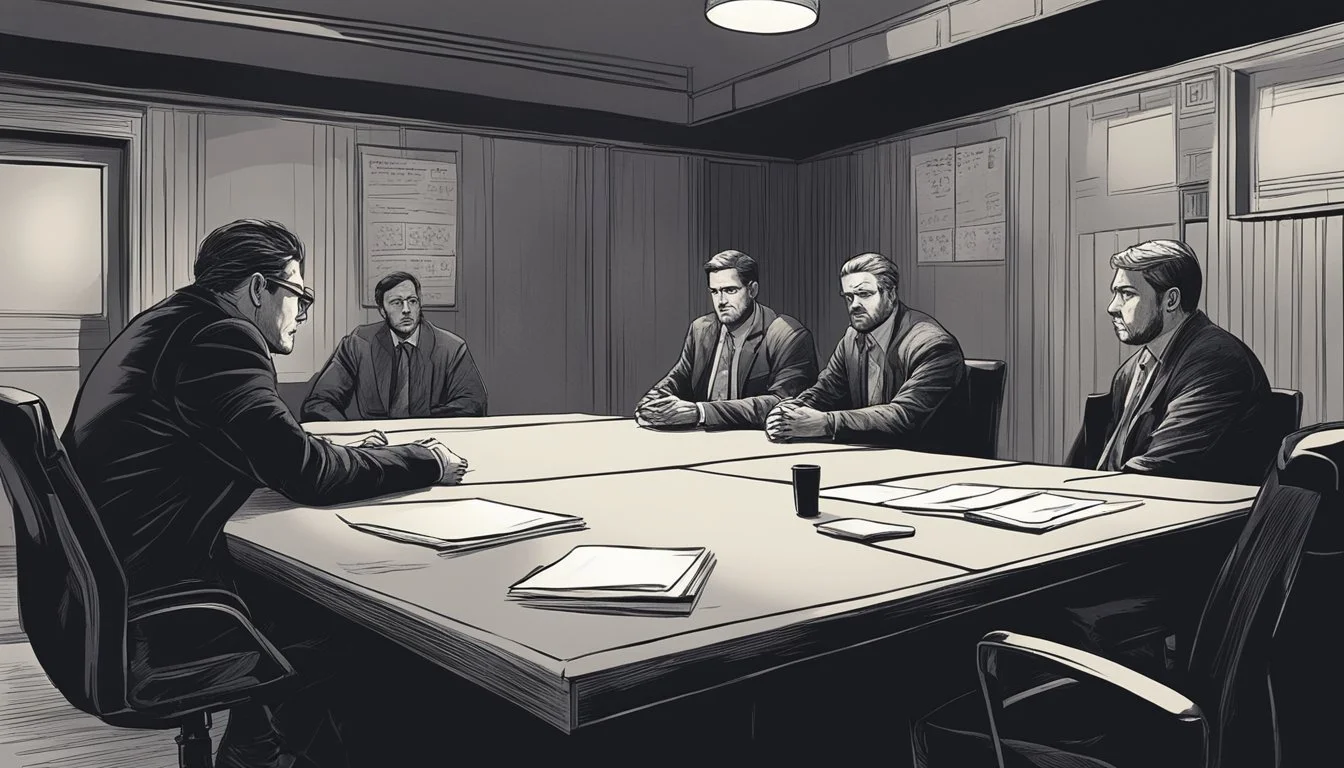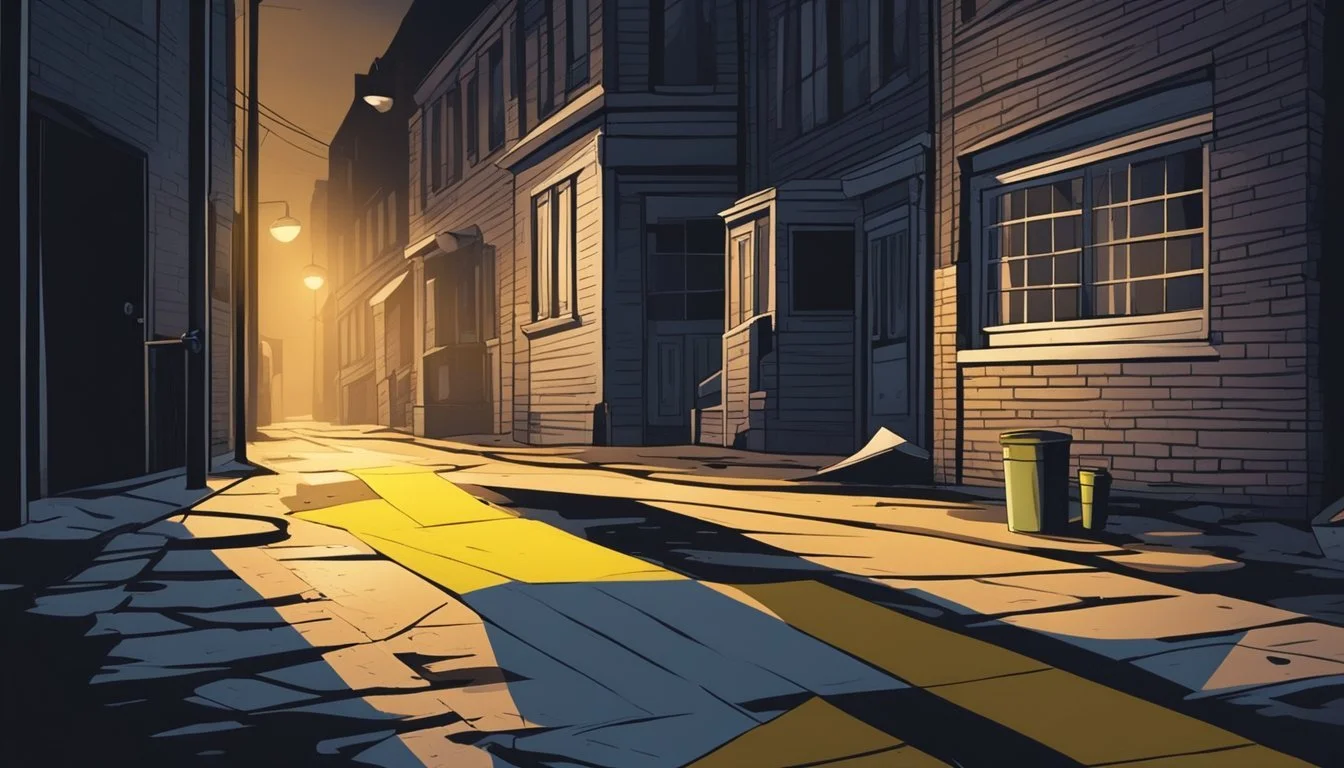Unraveling the Darkest Secrets: Must-Watch Crime Documentaries That Will Leave You Breathless!
Crime documentaries have captured the attention of audiences worldwide, offering a compelling blend of investigative journalism and storytelling. These gripping productions delve into real-life criminal cases, providing viewers with an inside look at some of the most notorious and perplexing crimes in history.
The best crime documentaries not only recount the facts of a case but also explore the psychological, social, and legal aspects surrounding it. From serial killers to unsolved mysteries, these films and series cover a wide range of criminal activities, often shedding new light on cases that have long puzzled law enforcement and the public alike.
Streaming platforms have played a significant role in the recent surge of crime documentary popularity. Netflix, in particular, has become a go-to source for true crime content, offering a diverse selection of documentaries that cater to different interests within the genre. Whether examining high-profile cases or uncovering lesser-known incidents, crime documentaries continue to captivate audiences and spark important conversations about justice, society, and human nature.
The True Crime Genre
True crime has captivated audiences for decades, evolving from books and newspaper articles to popular docuseries and podcasts. This genre explores real-life criminal cases, offering viewers a glimpse into the dark side of human nature.
Evolution of True Crime
True crime gained prominence in the mid-20th century with Truman Capote's "In Cold Blood," which blended journalistic reporting with narrative storytelling. This approach set the stage for future true crime works. In recent years, streaming platforms have fueled a surge in true crime content, particularly docuseries.
Netflix, HBO, and other networks have produced numerous critically acclaimed true crime documentaries. These series often delve deep into complex cases, presenting evidence and interviews over multiple episodes. The format allows for more thorough exploration of criminal investigations and their societal context.
True crime podcasts have also exploded in popularity, offering intimate audio narratives of criminal cases. This medium has made true crime content more accessible and engaging for audiences on the go.
Impact on Society
True crime media has significantly influenced public perception of the criminal justice system. It has raised awareness about wrongful convictions and flaws in investigative procedures. Some documentaries have even led to case reopenings and exonerations.
The genre has also sparked debates about ethics in journalism and media. Critics argue that true crime can sometimes sensationalize violence or re-traumatize victims' families. Supporters counter that it serves an important role in exposing injustices and educating the public about crime.
True crime has inspired a wave of amateur sleuths, with viewers actively discussing cases online and sometimes contributing to investigations. This phenomenon has both positive and negative implications for law enforcement and the judicial process.
Popularity of Crime Documentaries
Crime documentaries have surged in popularity, captivating audiences with their gripping narratives and investigations into real-life cases. This rise can be attributed to the growth of streaming platforms and a deep-seated cultural fascination with crime stories.
Rise in Streaming Platforms
Streaming services have revolutionized the way people consume true crime content. Netflix, Hulu, and HBO have invested heavily in producing high-quality crime documentaries. These platforms offer viewers unprecedented access to a vast array of true crime series and films.
Netflix has become a leader in the genre, releasing hit series like "Making a Murderer" and "The Keepers." Hulu has also made significant strides with productions such as "The Act" and "The Most Dangerous Animal of All."
HBO's "The Jinx" garnered critical acclaim and sparked renewed interest in its subject's case. The flexibility of streaming allows viewers to binge-watch entire series, fueling discussions and theories online.
Cultural Fascination With Crime Stories
True crime stories have long held a powerful grip on public imagination. Crime documentaries tap into this fascination by offering in-depth looks at notorious cases and criminals. They provide viewers with a mix of suspense, mystery, and psychological analysis.
These documentaries often explore the complexities of human nature and the justice system. They raise questions about guilt, innocence, and the nature of evil. Many viewers find themselves drawn to the puzzle-solving aspect of these stories.
The genre also satisfies a desire for justice, as cold cases are sometimes reopened due to public interest generated by documentaries. This real-world impact adds an extra layer of engagement for audiences.
Notable Crime Documentaries and Series
Crime documentaries and series have captivated audiences with their in-depth explorations of real-life cases. These programs offer viewers a chance to delve into complex investigations, legal proceedings, and the human stories behind notorious crimes.
Groundbreaking Docuseries
"Making a Murderer" sparked widespread interest in the true crime genre when it premiered in 2015. The series examined the case of Steven Avery and raised questions about the criminal justice system. "The Staircase" provided an intimate look at the trial of Michael Peterson, accused of murdering his wife. It became a benchmark for long-form crime documentaries.
"The Jinx: The Life and Deaths of Robert Durst" made headlines when its subject was arrested shortly before the finale aired. The six-part series explored the suspicious deaths surrounding real estate heir Robert Durst. "Wild Wild Country" captivated viewers with its tale of a controversial spiritual group in rural Oregon.
Award-Winning Documentaries
"Dear Zachary: A Letter to a Son About His Father" is widely regarded as one of the most emotionally impactful crime documentaries. The film's personal approach to a tragic story earned critical acclaim. "The Imposter" blended reenactments with real footage to tell the bizarre tale of a French con artist impersonating a missing Texas boy.
"Paradise Lost: The Child Murders at Robin Hood Hills" played a crucial role in bringing attention to the West Memphis Three case. Its impact extended beyond the screen, influencing public opinion and legal proceedings. "The Central Park Five" shed light on a miscarriage of justice, examining the wrongful conviction of five teenagers in a high-profile New York City case.
Key Themes in Crime Documentaries
Crime documentaries explore complex issues within the criminal justice system, societal problems, and personal stories of those impacted by crime. They shed light on systemic failures, corruption, and the lasting effects on victims and survivors.
The Justice System Portrayal
Crime documentaries often scrutinize the criminal justice system, exposing flaws and inconsistencies. They highlight cases of wrongful convictions, examining how innocent people end up behind bars. These films analyze evidence handling, witness testimony, and police procedures.
Some documentaries focus on high-profile trials, dissecting the courtroom drama and legal strategies employed. They may question jury selection processes or explore the impact of media coverage on verdicts.
Sentencing disparities and the effectiveness of rehabilitation programs also come under the microscope. Filmmakers interview judges, lawyers, and experts to provide insights into systemic issues.
Corruption and Crime
Many crime documentaries delve into corruption within law enforcement and government institutions. They expose cover-ups, evidence tampering, and abuse of power by those meant to uphold justice.
These films often track complex webs of criminal activity, from organized crime syndicates to white-collar fraud schemes. They may reveal how corruption enables criminal enterprises to flourish.
Documentaries sometimes follow journalists or whistleblowers as they uncover hidden truths. Interviews with former criminals or insiders provide rare glimpses into the inner workings of corrupt systems.
Victim and Survivor Stories
Crime documentaries frequently center on the experiences of victims and survivors. They give voice to those affected by violent crimes, sexual assault, and other traumatic events.
These films explore the long-term psychological impact of crime on individuals and communities. They may document the healing process and efforts to rebuild shattered lives.
Some documentaries follow victims' families in their quest for justice or closure. Others highlight support networks and advocacy groups working to prevent future crimes and help survivors.
Ethical considerations come into play when sharing these sensitive stories. Filmmakers must balance the need for truth-telling with respect for victims' privacy and well-being.
Production and Storytelling Techniques
Crime documentaries employ various methods to engage viewers and present compelling narratives. These techniques balance journalistic integrity with narrative construction while navigating ethical considerations.
Investigative Journalism
Thorough research forms the backbone of crime documentaries. Filmmakers conduct extensive interviews with key figures, including victims, witnesses, and law enforcement. They analyze court documents, police reports, and other official records.
Archival footage and photographs are often incorporated to provide historical context. Some documentaries use reenactments to visualize crucial events, though this technique requires careful consideration to avoid misleading viewers.
Field investigations may involve visiting crime scenes or conducting experiments to test theories. This hands-on approach can uncover new evidence or perspectives on the case.
Narrative Constructions
Crime documentaries often utilize storytelling techniques borrowed from fiction to create engaging narratives. They frequently employ a three-act structure: setup, confrontation, and resolution.
Pacing is crucial. Filmmakers strategically reveal information to build suspense and maintain viewer interest. They may use cliffhangers at episode endings to encourage binge-watching.
Voice-over narration can guide viewers through complex cases. Some documentaries feature the filmmaker as an on-screen presence, becoming part of the story.
Visual elements like graphics, timelines, and maps help clarify complex information. Music and sound design enhance mood and emotional impact.
Ethics and Representation
Crime documentaries must navigate ethical challenges in their pursuit of truth. Filmmakers have a responsibility to accurately represent events and individuals involved.
Consent is crucial when interviewing subjects, especially victims and their families. Documentarians must balance the public's right to know with individuals' privacy rights.
The portrayal of suspects requires careful consideration. Documentaries should avoid sensationalism or unfair bias, presenting evidence objectively.
Transparency about sources and methods is essential for maintaining credibility. Filmmakers should disclose any potential conflicts of interest or limitations in their investigation.
Ethical documentarians consider the impact of their work on ongoing investigations and legal proceedings. They must also be mindful of potential consequences for individuals featured in their films.
Real-Life Cases and Their Documentary Treatment
True crime documentaries explore notorious criminal cases, shedding light on the darkest aspects of human behavior. These films delve into the psyche of killers, expose systemic injustices, and reveal hidden truths behind headline-grabbing crimes.
Infamous Serial Killers
Ted Bundy's case garnered renewed attention with "Conversations with a Killer: The Ted Bundy Tapes." This Netflix series used archival footage and audio recordings to provide chilling insights into the mind of the notorious serial killer.
Other documentaries have focused on figures like Jeffrey Dahmer and John Wayne Gacy. These films often combine police interviews, courtroom footage, and expert analysis to piece together the timeline of their crimes.
Some documentaries explore lesser-known serial killers, bringing attention to overlooked cases. They frequently examine the killers' backgrounds, seeking to understand the factors that led to their heinous acts.
Cults and Abuse
"Wild Wild Country" chronicled the rise and fall of the Rajneeshpuram community in Oregon. The series highlighted the complex dynamics of cult leadership and the impact on followers and local residents.
"The Vow" examined the NXIVM cult, exposing its manipulative practices and abusive leadership. Through insider accounts and archival footage, the documentary revealed how seemingly ordinary people became entangled in a dangerous organization.
"The Trials of Gabriel Fernandez" shed light on systemic failures in child protective services. This harrowing series documented the abuse suffered by an 8-year-old boy, prompting discussions about institutional accountability.
Wrongful Convictions and Exonerations
"The Thin Blue Line" is a landmark documentary that helped exonerate Randall Dale Adams, who was wrongfully convicted of murder. The film's innovative approach to reenactments and interviews set a new standard for investigative documentaries.
"The Central Park Five" examined the wrongful conviction of five teenagers for a brutal attack in New York City. The documentary highlighted issues of racial bias in the justice system and media coverage.
Recent series like "Making a Murderer" and "The Innocence Files" have brought renewed attention to potential miscarriages of justice. These documentaries often spark public debate and can lead to renewed legal efforts for the accused.
Platforms and Accessibility
Crime documentaries have become readily available across various streaming platforms and television networks. This increased accessibility has fueled the genre's popularity and allowed viewers to engage with true crime content on-demand.
Major Streaming Services
Netflix leads the pack in true crime offerings, consistently producing and acquiring high-profile series and films. The platform's extensive library includes critically acclaimed documentaries like "Making a Murderer" and "The Keepers."
HBO Max has also made significant strides in the genre, featuring compelling series such as "I'll Be Gone in the Dark" and "The Vow."
Peacock, NBCUniversal's streaming service, hosts a growing collection of true crime content, including original productions and classic documentaries.
Each platform employs unique approaches to the genre, catering to different audience preferences and storytelling styles.
Television Networks and Coverage
Traditional television networks continue to play a crucial role in broadcasting crime documentaries.
A&E, Investigation Discovery, and Oxygen have built reputations as go-to channels for true crime content. These networks offer a mix of one-off specials and multi-part series.
CBS's "48 Hours" and NBC's "Dateline" remain popular long-running programs, delivering in-depth coverage of criminal cases to millions of viewers weekly.
Many networks now provide on-demand access to their crime documentaries through dedicated apps and websites, further expanding viewer options.
Critical Reception and Impact
Crime documentaries have garnered significant attention from audiences and critics alike, often sparking important conversations about justice and society. Award-winning true-crime documentaries have left a lasting impression on viewers and the genre itself.
Audience Reception
True crime documentaries captivate audiences with their compelling storytelling and exploration of real-life criminal cases. Viewers are drawn to the immersive experiences these films provide, often generating deep empathy for victims and their families. The genre's popularity has soared in recent years, with series like "Making a Murderer" attracting widespread attention and sparking discussions about the legal system.
Many true crime documentaries resonate across cultural boundaries, touching on universal themes of justice and human nature. The emotional impact of these films can be profound, leaving lasting impressions on viewers long after watching. Some documentaries, like "Dear Zachary," have become cultural touchstones, praised for their raw honesty and innovative approaches to storytelling.
Critics and Awards
Critics have lauded many true crime documentaries for their groundbreaking storytelling techniques and social commentary. These films often receive praise for shedding light on flaws in the criminal justice system and challenging public perceptions of guilt and innocence. "The Thin Blue Line" is credited with helping establish true crime as a respected genre of entertainment and social critique.
Award-winning documentaries in this genre have garnered accolades from prestigious film festivals and organizations. Critics appreciate the innovative methods used to present complex legal cases in engaging, accessible ways. Some documentaries have influenced public opinion on specific cases, occasionally leading to real-world legal developments or renewed investigations.
The critical success of true crime documentaries has elevated the genre's status in the film industry. These works are increasingly recognized for their artistic merit and social impact, earning nominations and wins at major award ceremonies. The genre continues to evolve, with critics praising new technologies and storytelling approaches that push the boundaries of documentary filmmaking.
Future of Crime Documentaries
Crime documentaries are evolving rapidly, embracing new technologies and storytelling techniques. The genre is poised for significant changes in the coming years as audience expectations and production capabilities advance.
Emerging Trends and Forecasts
Interactive elements are becoming more prevalent in crime documentaries. Viewers may soon be able to explore 3D crime scene reconstructions or access additional evidence through companion apps.
Podcasts are influencing documentary formats, with some series adopting episodic structures and cliffhanger endings to boost engagement.
Ethical considerations are gaining prominence. Documentarians are increasingly focused on victim advocacy and exploring systemic issues behind crimes.
Cross-platform storytelling is on the rise. A single crime story might span multiple mediums, including TV series, podcasts, and social media content.
Technology and Innovations
Virtual reality (VR) is set to transform crime documentaries. Viewers may soon be able to virtually walk through crime scenes or witness reenactments in immersive 3D environments.
Artificial intelligence is aiding in the analysis of cold cases. AI tools can process vast amounts of data, potentially uncovering new leads or connections.
Blockchain technology could enhance the authenticity of evidence presented in documentaries. This would allow viewers to verify the source and integrity of key information.
Advanced DNA analysis techniques are likely to feature prominently in future crime documentaries, shedding new light on unsolved cases.




